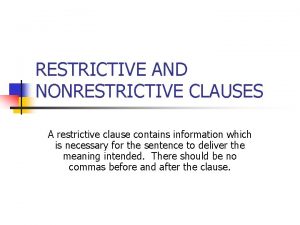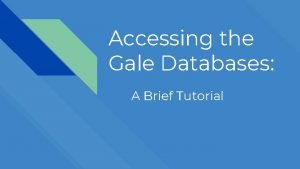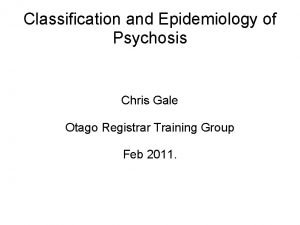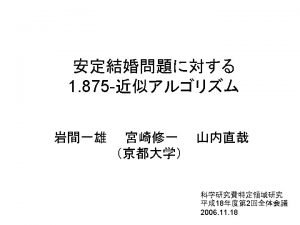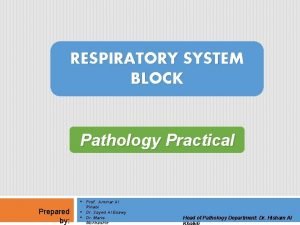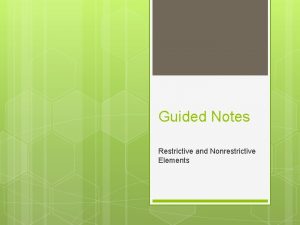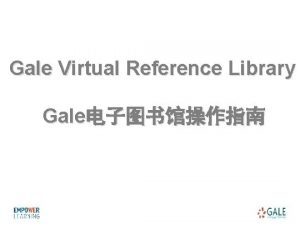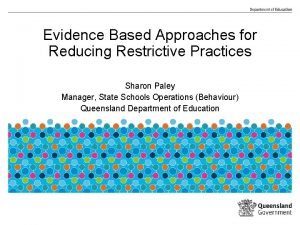Restrictive Practices Anne Gale SA Office of the

















- Slides: 17

Restrictive Practices Anne Gale SA Office of the Public Advocate June 2018 Office of the Public Advocate 1

Outline Legislation Role of the Public Advocate Informal arrangements The role of SACAT Guardianship orders Restrictive Practices Office of the Public Advocate 2

South Australian Context Legislation South Australian Civil and Administrative Tribunal Act, 2013 Guardianship and Administration Act, 1993 Mental Health Act, 2009 Consent to Medical Treatment and Palliative Care Act, 1995 Office of the Public Advocate 3

The Public Advocate Established under the Guardianship and Administration Act 1993 (GAA) Independent statutory position; reports to Minister and Parliament Functions in the GAA: Promoting and protecting the rights of people with mental incapacity; Giving support to and promoting the interests of carers of mentally incapacitated persons; Identifying areas of unmet needs of people with mental incapacity; Giving advice on the Act and alternatives to guardianship; Acting as guardian of last resort. Dispute Resolution Functions set out in Advance Care Directives (ACD) Act 2013 & (amendments to) the Consent to Medical Treatment and Palliative Care (Consent) Act 1995 Office of the Public Advocate 4

Informal Arrangements Often, people with mental incapacity cannot make their own decisions, even with support, but do have family, friends, carers who make decisions for them. This is called Informal Arrangements The following decisions can be made under informal arrangements, without needing to be appointed guardian: In home services • Can arrange for community support if the person does not object • Accommodation • Can arrange for a person to move to residential care – if the person does not object to moving. Office of the Public Advocate 5

Informal Arrangements (cont) Health Care /Medical Treatment if there is no Advance Care Directive and person making the decisions is a ‘person responsible’ under the Consent to Medical Treatment and Palliative Care Act 1995. There is a ‘hierarchy’ in determining who the ‘person responsible’ is: Guardian appointed by SACAT (i. e. formal substitute decision maker); Prescribed relative with a close and continuing relationship, being: A spouse or domestic partner; Adult related by blood or marriage or adoption; Aboriginal or Torres Strait Islander kinship/marriage Adult friend with a close and continuing relationship; Adult charged with overseeing ongoing day-to-day supervision. Office of the Public Advocate 6

Informal Arrangements (cont) If informal arrangements work well, there is no need to seek a guardianship order Sometimes informal arrangements break down, eg: disagreement between family, friends or those involved in a person’s care about who should make the decision or what decision to make disagreement between the carer and the person with a mental incapacity The person with impairment is refusing the decisions Apply to SACAT for guardianship order if a decision is needed; including restrictive practices www. sacat@sa. gov. au Office of the Public Advocate 7

Informal Arrangements (cont) Restrictive Practices, in section 32 of the GAAct, Cannot be approved through informal arrangements If a need arises, generally a guardian must be appointed Only a guardian (private or Public Advocate) can apply for special powers – to SACAT gives authority Office of the Public Advocate 8

The Role of SACAT The South Australian Civil and Administrative Tribunal (SACAT) helps people to resolve certain legal issues, including guardianship. SACAT appoints guardians to make decisions about accommodation, health and lifestyle. SACAT can also: Change or cancel a guardianship order; Provide advice or direction to a guardian; Agree to certain medical treatment; Grant special powers that authorise detention and the use of force - restrictive practices (section 32 GAAct) Approve ITOs and CTOs – Mental Health Act – restrictive practices can be used under these orders – time limited Office of the Public Advocate 9

Being a Guardians are authorised to make substitute decisions with the same authority as if the person made the decision themselves. Decisions about accommodation, health, lifestyle – depending on whether the guardianship order is full or limited. If a restrictive practice is approved (eg locked fridge) by a guardian under a lifestyle decision, it requires a positive behaviour support plan Office of the Public Advocate 10

Special Powers (s 32 GAAct) Restrictive Practices The powers enable: A direction to be given as to where someone lives Detaining a person The authorisation of the use of force as may be reasonably necessary for the purposes of: ensuring proper medical or dental treatment, day-to-day care and The well being of the person Only make an order if the health or safety of the person or others is seriously at risk (evidence needed) Office of the Public Advocate 11

Special Powers (cont) Guardians are not able to authorise these kinds of restrictive practices under an ordinary order To protect the rights and freedoms of people under guardianship, need to apply to SACAT for special powers to do this (s 32 GAAct) Only if the health or safety of the person, or the safety of others, is at risk Last resort only because of the restriction on rights and freedoms Office of the Public Advocate 12

Positive Behaviour Support Plans Public Advocate delegated guardians should only approve restrictive practices when a PBSP exists – not in SA legislation (OPA practice) SACAT considering how it will address in its future processes Must be provided to the NDIS QS Commission Processes being developed between SA and QSC Office of the Public Advocate 13

OPA’s Information Service Operates between 9: 00 – 5: 00 pm – Emergencies only after hours Provides information on Advance Care Directives Act 2013; Consent to Medical Treatment and Palliative Care Act 1995; Guardianship and Administration Act 1993; Mental Health Act 2009 Written information – fact sheets Presentations/education (involving relevant OPA staff) Referrals to other agencies as appropriate Office of the Public Advocate 14

Private Guardians Manual OPA recently produced a Private Guardians Manual – plain English and Easy Read versions Provides information about decision -making and being a guardian http: //www. opa. sa. gov. au/resources/private_g uardian_resources Office of the Public Advocate 15

Office of the Public Advocate An independent statutory office accountable to the South Australian Parliament PO Box 213, Prospect, 5082 Tel (08) 8342 8200 Toll Free 1800 066 969 Fax (08) 8342 8250 Email opasa@opa. sa. gov. au Web www. opa. sa. gov. au Office of the Public Advocate 16

Thank you Any questions? Office of the Public Advocate 17
 Non restrictive clause
Non restrictive clause Gale bach
Gale bach Allen and gale 2000
Allen and gale 2000 Gale database login
Gale database login Chris gale otago
Chris gale otago Nicki ward
Nicki ward Gale and shapley 1962
Gale and shapley 1962 Great coastal gale of 2007
Great coastal gale of 2007 Shapley
Shapley Kovaltani
Kovaltani Beaufort scale
Beaufort scale Thomson gale
Thomson gale Brian gale
Brian gale Emphysème
Emphysème Reduced restrictive relative clause
Reduced restrictive relative clause Bronchodilator test positive
Bronchodilator test positive Chapter 5 cash control systems answer key
Chapter 5 cash control systems answer key Terminology relating to restrictive practice
Terminology relating to restrictive practice
